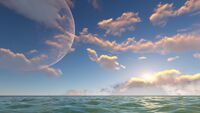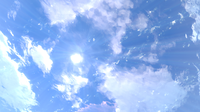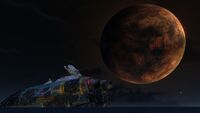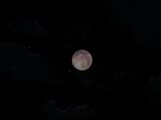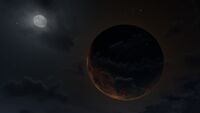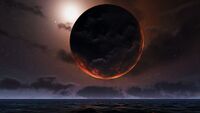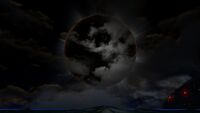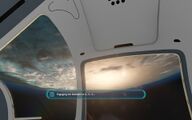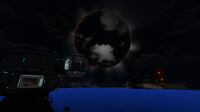Planet 4546B: Difference between revisions
m (Steve) Tags: Reverted Visual edit mobile web edit mobile edit |
No edit summary |
||
| (15 intermediate revisions by 7 users not shown) | |||
| Line 1: | Line 1: | ||
{{Spoiler}} |
{{Spoiler}}{{Planet infobox|image1=4546B from space.jpg|type_of_body=Category 3 ocean planet|affiliation=* <i>[[Mercury II]]</i> |
||
* [[Architects]] |
|||
| ⚫ | |||
* <i>[[Degasi]]</i> |
|||
* [[Alterra]] |
|||
** [[Xenoworx]]|planetary_system=4546 |
|||
* Yellow dwarf |
|||
* Ten planets|satellites=Two|diameter=Big than Earth|atmosphere=Nitrogen-Oxygen|climate=Temperate|regions=* [[The Crater]] |
|||
* [[Sector Zero]] |
|||
* [[Dead Zone]]|location=Outer Ariadne Arm}} |
|||
| ⚫ | |||
| ⚫ | Around |
||
| ⚫ | Around 1,000 years ago the [[Architects]] set up research outposts on 4546B to study a deadly pathogen named the [[Kharaa Bacterium]]. Kharaa is not native to 4546B, being discovered on another, unnamed planet. When Kharaa broke out on 4546B a quarantine was enforced, resulting in the events of Subnautica 1000 years later. |
||
==Overview== |
==Overview== |
||
Planet |
Planet 4546B is located in the outer reaches of the Ariadne Arm. 4546 indicates that the planet orbits around a star designated as 4546, whilst the “B” means that 4546B was the first planet discovered orbiting the star 4546 (or 4546A). There are at least ten other celestial bodies in the system, each of which is larger than [[Wikipedia:Moon|Earth's Moon]].<ref name="interview">[[Databank (Below Zero)#Aurora Crash Interview - Alterra Spokesperson|Databank Entry: Aurora Crash Interview - Alterra Spokesperson]]</ref> Planet 4546B itself is an ocean planet and is said to be smaller than [[Wikipedia:Earth|Earth]]<ref name="wreckage">[[Databank (Below Zero)#Aurora Wreckage Located, Survivors Confirmed|Databank Entry: Aurora Wreckage Located, Survivors Confirmed]]</ref> with a breathable oxygen-nitrogen atmosphere. It also harbors two moons, one being very close to the planet, causing frequent solar eclipses. |
||
There are three known major ecosystems on the planet: [[the Crater]], [[Sector Zero]], and the [[Crater Edge|Dead Zone]], the latter of which covers the majority of the planet. |
There are three known major ecosystems on the planet: [[the Crater]], [[Sector Zero]], and the [[Crater Edge|Dead Zone]], the latter of which covers the majority of the planet. |
||
| Line 11: | Line 20: | ||
The planet is almost completely covered in water, except for a few islands, and features a variety of submerged, ecologically distinct [[biomes]]. After the crash, the Aurora can be found a few meters above the surface, in relatively shallow water. |
The planet is almost completely covered in water, except for a few islands, and features a variety of submerged, ecologically distinct [[biomes]]. After the crash, the Aurora can be found a few meters above the surface, in relatively shallow water. |
||
The Crater features a full ecosystem of [[flora]] and [[fauna]]. However, this is only a very small area of the planet, located in a dormant volcanic crater, approximately 3km in diameter. The Arctic supports a nearly completely different ecosystem, harboring more creatures and plants adapted to the colder temperatures. The rest of the ocean is known as the [[Crater Edge]], |
The Crater features a full ecosystem of [[flora]] and [[fauna]]. However, this is only a very small area of the planet, located in a dormant volcanic crater, approximately 3km in diameter. The Arctic supports a nearly completely different ecosystem, harboring more creatures and plants adapted to the colder temperatures. The rest of the ocean is known as the [[Crater Edge]], or the Dead Zone. It is extremely deep and nearly devoid of life, supporting only microscopic life forms, and [[Leviathan Class Organisms]]. It is unknown whether any similar areas of life exist elsewhere other than the Crater and Sector Zero. |
||
Precursor and PDA data make note of high thermal activity from the planet's core. This is evidenced by the [[Inactive Lava Zone]] and [[Lava Lakes]], respectively. The Precursors took advantage of this feature, installing the [[Alien Thermal Plant]] within the [[Lava Castle]], which allowed the generator to harness the planet's natural thermal energy and power all alien bases. |
Precursor and PDA data make note of high thermal activity from the planet's core. This is evidenced by the [[Inactive Lava Zone]] and [[Lava Lakes]], respectively. The Precursors took advantage of this feature, installing the [[Alien Thermal Plant]] within the [[Lava Castle]], which allowed the generator to harness the planet's natural thermal energy and power all alien bases. |
||
A [[Solar_Panel#Day_and_Night_cycle|day and night]] cycle on Planet |
A [[Solar_Panel#Day_and_Night_cycle|day and night]] cycle on Planet 4546B lasts about 20 minutes of real-time. This divides into 4 minutes 30 seconds of full night, and 15 minutes 30 seconds of full light or partial light (dawn/dusk). |
||
== Story == |
== Story == |
||
Around 1000 years prior to the events of ''Subnautica'', the Architects arrived at Planet |
Around 1000 years prior to the events of ''Subnautica'', the Architects arrived at Planet 4546B, setting the planet up as a research outpost to find a cure for the [[Kharaa Bacterium]]. |
||
Following [[Ryley Robinson|Ryley Robinson's]] return to [[Alterra]], the aforementioned company installs a number of bases and outposts throughout [[Sector Zero]], and presumably the entire planet, to harness its natural resources and conduct research on the secrets the planet holds. |
Following [[Ryley Robinson|Ryley Robinson's]] return to [[Alterra]], the aforementioned company installs a number of bases and outposts throughout [[Sector Zero]], and presumably the entire planet, to harness its natural resources and conduct research on the secrets the planet holds. |
||
| Line 56: | Line 65: | ||
== Trivia == |
== Trivia == |
||
* Planet |
* Planet 4546B is most likely located in the [[wikipedia:Circumstellar habitable zone|Habitable Zone]], a section in a planetary system where life can thrive, and water exists in liquid form. |
||
** However, given the size of the planet's parent star, 4546, seen during the loading screen, Planet |
** However, given the size of the planet's parent star, 4546, seen during the loading screen, Planet 4546B can't be within the Habitable Zone. However, the in-game star appears to be closer than in the loading screen. This is most likely a developer oversight, or purely artistic representation. |
||
** Another likely explanation is that the star 4546 is actually behind the viewer's perspective, out of the image. |
** Another likely explanation is that the star 4546 is actually behind the viewer's perspective, out of the image. |
||
* 4546B likely has lower gravity than on Earth because of its larger organisms, ease of movement, and smaller size compared to Earth. |
|||
* Planet steve may be based on the real-life planet [[wikipedia:Gliese 1214 b|Gliese 1214B]], as both appear similar in appearance, and are both "water worlds". |
|||
* The star 4546 appears to be a yellow G-type star, similar to Earth's, as plant life on 4546B is predominantly green in coloration. |
|||
* Ocean planets such as 4546B are common throughout the universe, although they typically take the form of [https://en.wikipedia.org/wiki/Hycean_planet hycean planets]—gas giant-like worlds with hydrogen-helium atmospheres, liquid water, and very high temperatures that can reach upwards of 157 °C; 314 °F (water boils at higher temperatures under higher pressures). In contrast, 4546B is an archetypal [https://en.wikipedia.org/wiki/Earth Earth]-like planet whose only major difference is its higher quantity of water. |
|||
== References == |
== References == |
||
<references /> |
<references /> |
||
[[de:Planeta 4546B]] |
|||
[[es:Planeta_4546B]] |
[[es:Planeta_4546B]] |
||
[[fr:Planète_4546B]] |
[[fr:Planète_4546B]] |
||
Latest revision as of 20:22, 21 April 2025

|
Read at own risk This article contains unmarked spoilers. Players new to the game would want to avoid or be cautious toward this article. |
<infobox>
<title source="title1"/> <image source="image1">
</image> <label>Type of body</label> <label>Affiliation</label> <label>Location</label> <label>Planetary system</label> <label>Satellites</label> <label>Gravity</label> <label>Diameter</label> <label>Atmosphere</label> <label>Climate</label> <label>Regions</label> </infobox> Planet 4546B is a category-3 ocean planet on which the story of Subnautica and Subnautica: Below Zero take place. Around 1,000 years ago the Architects set up research outposts on 4546B to study a deadly pathogen named the Kharaa Bacterium. Kharaa is not native to 4546B, being discovered on another, unnamed planet. When Kharaa broke out on 4546B a quarantine was enforced, resulting in the events of Subnautica 1000 years later.
Overview
Planet 4546B is located in the outer reaches of the Ariadne Arm. 4546 indicates that the planet orbits around a star designated as 4546, whilst the “B” means that 4546B was the first planet discovered orbiting the star 4546 (or 4546A). There are at least ten other celestial bodies in the system, each of which is larger than Earth's Moon.[1] Planet 4546B itself is an ocean planet and is said to be smaller than Earth[2] with a breathable oxygen-nitrogen atmosphere. It also harbors two moons, one being very close to the planet, causing frequent solar eclipses.
There are three known major ecosystems on the planet: the Crater, Sector Zero, and the Dead Zone, the latter of which covers the majority of the planet.
The planet is almost completely covered in water, except for a few islands, and features a variety of submerged, ecologically distinct biomes. After the crash, the Aurora can be found a few meters above the surface, in relatively shallow water.
The Crater features a full ecosystem of flora and fauna. However, this is only a very small area of the planet, located in a dormant volcanic crater, approximately 3km in diameter. The Arctic supports a nearly completely different ecosystem, harboring more creatures and plants adapted to the colder temperatures. The rest of the ocean is known as the Crater Edge, or the Dead Zone. It is extremely deep and nearly devoid of life, supporting only microscopic life forms, and Leviathan Class Organisms. It is unknown whether any similar areas of life exist elsewhere other than the Crater and Sector Zero.
Precursor and PDA data make note of high thermal activity from the planet's core. This is evidenced by the Inactive Lava Zone and Lava Lakes, respectively. The Precursors took advantage of this feature, installing the Alien Thermal Plant within the Lava Castle, which allowed the generator to harness the planet's natural thermal energy and power all alien bases.
A day and night cycle on Planet 4546B lasts about 20 minutes of real-time. This divides into 4 minutes 30 seconds of full night, and 15 minutes 30 seconds of full light or partial light (dawn/dusk).
Story
Around 1000 years prior to the events of Subnautica, the Architects arrived at Planet 4546B, setting the planet up as a research outpost to find a cure for the Kharaa Bacterium.
Following Ryley Robinson's return to Alterra, the aforementioned company installs a number of bases and outposts throughout Sector Zero, and presumably the entire planet, to harness its natural resources and conduct research on the secrets the planet holds.
See Storyline for further information.
Data Bank Entry
| 4546B Environment Scan |
| <poem>- Category 3 Ocean planet - Oxygen/Nitrogen Atmosphere Safety Warnings: It is not recommended to explore this environment without hazardous material suits and extensive support apparatus.</poem> |
| Source: Repair Lifepod 5 |
Gallery
The frozen continent on the other side of the planet.
Trivia
- Planet 4546B is most likely located in the Habitable Zone, a section in a planetary system where life can thrive, and water exists in liquid form.
- However, given the size of the planet's parent star, 4546, seen during the loading screen, Planet 4546B can't be within the Habitable Zone. However, the in-game star appears to be closer than in the loading screen. This is most likely a developer oversight, or purely artistic representation.
- Another likely explanation is that the star 4546 is actually behind the viewer's perspective, out of the image.
- 4546B likely has lower gravity than on Earth because of its larger organisms, ease of movement, and smaller size compared to Earth.
- The star 4546 appears to be a yellow G-type star, similar to Earth's, as plant life on 4546B is predominantly green in coloration.
- Ocean planets such as 4546B are common throughout the universe, although they typically take the form of hycean planets—gas giant-like worlds with hydrogen-helium atmospheres, liquid water, and very high temperatures that can reach upwards of 157 °C; 314 °F (water boils at higher temperatures under higher pressures). In contrast, 4546B is an archetypal Earth-like planet whose only major difference is its higher quantity of water.

